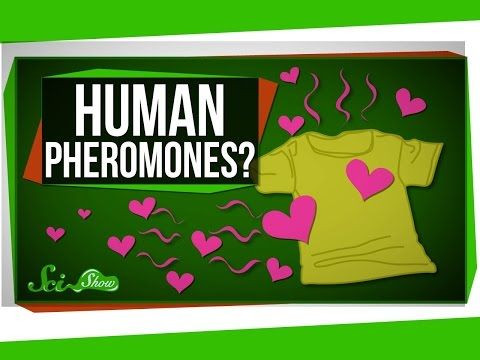It's Complicated: The Science Behind Human Pheromones And Love Attraction

This may sound strange, but a smelly armpit or a sweaty gym sock could possibly send powerful signals of attraction to the people around you. Pheromones, often referred to as a "chemical perfume," are released by some species to communicate, prompting some kind of behavioral or psychological reaction. But, are humans really able to secrete pheromones to attract the opposite sex?
Pheromones are made of various molecules, which are usually detected by smell, according to Sci Show's video, “Do Humans Have Pheromones?” Depending on the species, they might travel through air or water, or just be deposited straight onto the recipient. The goal of these chemical messengers is to prompt some kind of behavioral or psychological reaction.
In 1959, the first official pheromone — called bombykol — which is released by female silkworm moths to attract males, was discovered. Exposure to a mature lady moth induced a particular behavior in a receiving male moth, leading to a lot of wing fluttering. The researchers isolated and synthesized bombykol molecules, and showed that they had exactly the same effect.
So, if they affect animals so much, do pheromones exist in humans, and can they help us romantically?
It’s likely that we do have pheromones, just because we're related to so many other mammals that do. There are a few well-known studies that seem to suggest we have them, like the famous 1994 t-shirt sniffing experiment. Here, the researchers found women preferred the scent of men with different immune system genetics than their own.
As humans, we often respond to scents because of their context, not necessarily because of something about the molecules they're made of. Plus, we’re all about conscious choice. A lack of smell won't interfere with our life cycles, or limit our social behaviors too much.
So, if pheromones do influence our behavior, the effects are likely subtle. This subtlety, combined with the belief that humans are also greatly influenced by sight, sound, memory, learning, context, and social norms, is another reason why the potential existence and influence of human pheromones is still a mystery.
Currently, French researchers are looking instead at babies, and how chemicals secreted by nursing mothers affect sucking and mouth motion behavior in newborns. If a molecule from that secretion can be identified, synthesized, and shown to induce these behaviors in any baby, then we may have our first official human pheromone.



























